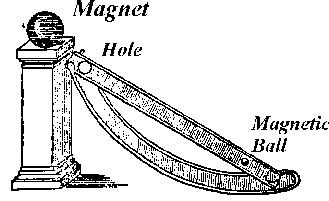(Part two of two on the apologetics offered by missionaries outside the Reason Rally)
In my second discussion outside the Reason Rally, a pair of tag-teaming Christians were trying to bootstrap from my belief in immaterial laws of logic or morality to evidence for an immaterial God. They must have thought they were handed a trump card when I admitted I find the doctrine of Original Sin to have an intuitive resonance. Humans have a tendency toward disorder, and the cruelties we commit warp our spirits and make it harder to be good in the future.
My Christian interlocutors seemed baffled I could recognize the destructive power of sin/immorality (depending on which of us was talking) but wouldn’t concede that Grace existed as a countervailing force. If I could recognize the would, they thought, I must be able to believe in the process (or Person) that could heal it. Their argument reminded me of C.S. Lewis’s contention that a desire is evidence that something exists to satisfy that desire.
Here’s the parallel argument I wanted to bring up to them (but we got diverted onto another topic). Some discussions of sin sound like the Second Law of Thermodynamics applied to the soul. Gradually entropy increases and order fades out of existence. We have an intuitive resistence to this idea, whether applied to the soul or the body or perpetual motion machines. I tend to get frustrated by it most in the lay approach to medicine.

Cancer actually arises through a similar process. Your cells become your enemy though gradual degeneration. Mutations and deletions accumulate during successive cell divisions until the safeguards against out of control reproduction have been eroded away. The popular hopes for a general cure for cancer seem like Lewis-like thinking to me. The layperson’s perception of science is still powerfully shaped by antibiotics — the miracle drugs. The state of being healthy feels so natural and is so clearly what we ought to be that it feels like we must be able to fall back into the default.
We imagine health or goodness corresponds to an equilibrium with low potential energy. It must take energy to be warped, and more energy to stay broken and resist sinking into that natural resting state. Like a ball balanced precariously at the top of a ramp, we must only need a small impetus to be restored.
But we know now that’s not how everything in the physical world works. I can’t do better than to quote Arcadia by Tom Stoppard, where one character explains why the study of heat upended our Newtonian ideas about the world (I did some splicing, so go to Northwestern for a fuller quote):
Your tea gets cold by itself, it doesn’t get hot by itself. Do you think that’s odd? …Well, it is odd. Heat goes to cold. It’s a one-way street. Your tea will end up at room temperature. What’s happening to your tea is happening to everything everywhere…
You can’t run the film backwards. Heat was the first thing which didn’t work that way. Not like Newton. A film of a pendulum, or a ball falling through the air — backwards, it looks the same. But with heat — friction — a ball breaking a window — it won’t work backwards. You can put back the bits of glass but you can’t collect up the heat of the smash. It’s gone.
Identifying a way people break isn’t proof they can be restored.












